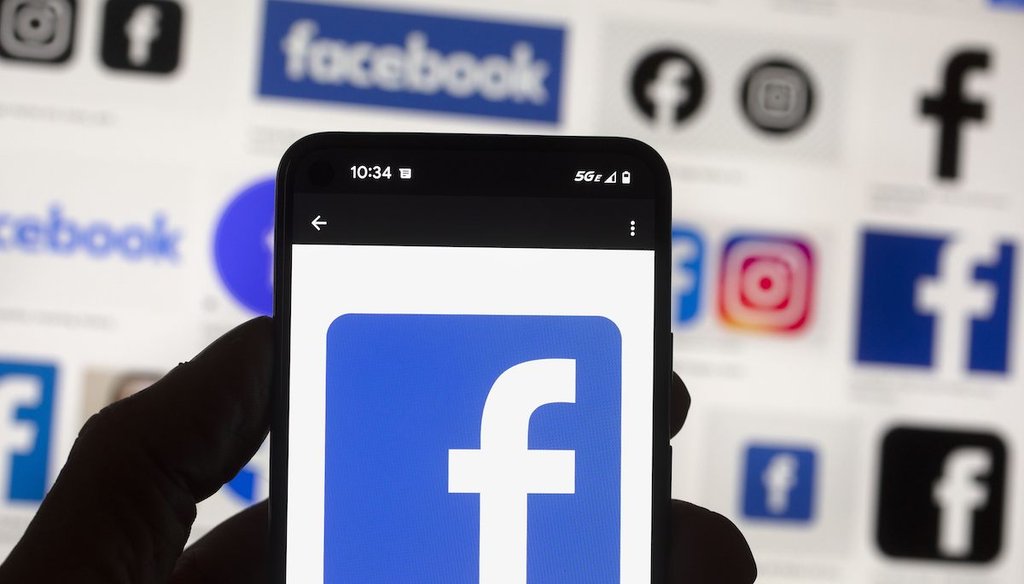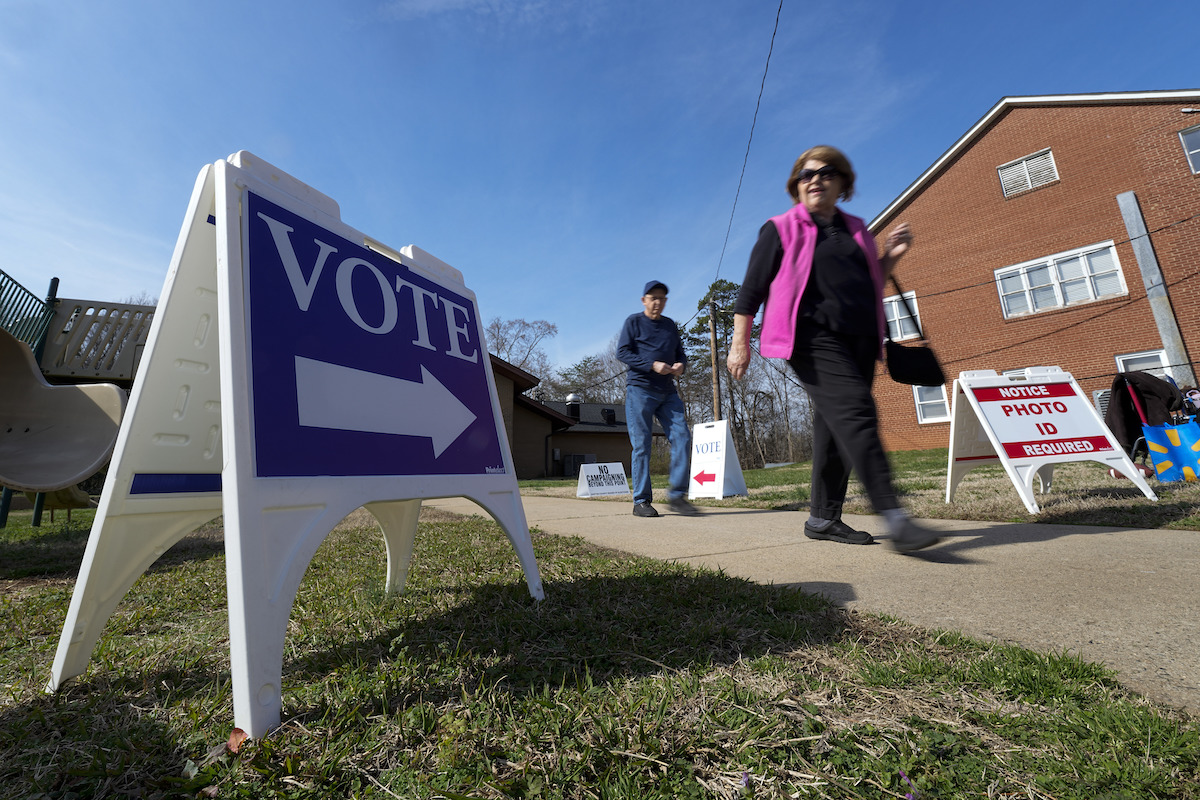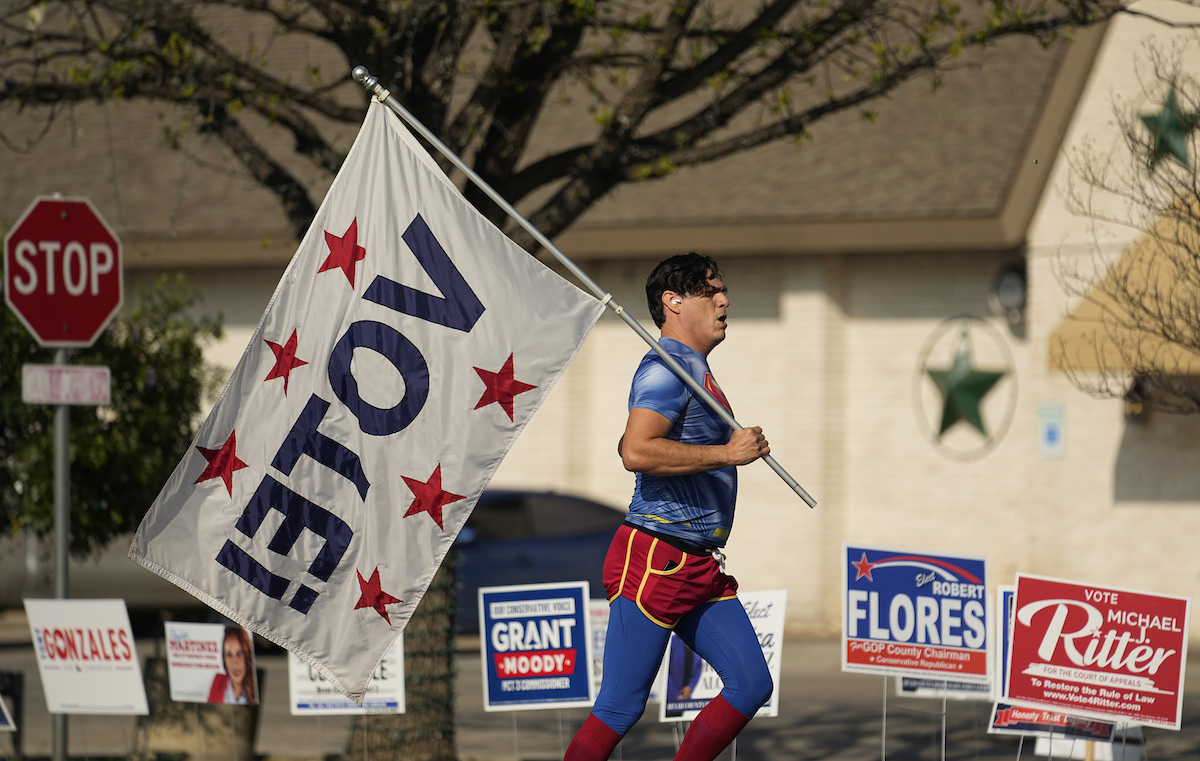Stand up for the facts!
Our only agenda is to publish the truth so you can be an informed participant in democracy.
We need your help.
I would like to contribute

The Facebook logo is seen on a mobile phone, Oct. 14, 2022, in Boston. (AP)
If Your Time is short
-
Biden administration officials said they knew of no malicious cyberactivity or any connection between March 5 Meta platform outages and the 2024 primary elections.
-
Election officials in multiple jurisdictions told PolitiFact the outages did not affect voting. Although election officials use social media to communicate with voters on Election Day, they also have other methods to provide information, such as county elections websites.
-
Our mission: Help you be an informed participant in democracy. Learn more.
It’s Election Day in November 2024. Across the U.S., voters are heading to the polls. And major social media platforms are not working.
The scenario could alarm voters and draw news organizations’ attention. But would it affect voting?
A similar incident played out March 5, when Meta platforms including Facebook, Instagram and Threads stopped working worldwide for about two hours. The outages happened on Super Tuesday, when voters in 16 states and one territory were casting their ballots in the presidential primary.
DownDetector, a website that tracks outages using methods including user-submitted reports, said that more than 500,000 Facebook outages and 79,000 Instagram outages were reported around 10:30 a.m Eastern Time.
The issue appeared to be resolved and access restored within a few hours.
X users speculated that the outages were linked to the election, nefarious — and possibly a trial run for a bigger incident in November.
"All major socials went down and regained at almost the exact same time," read one X post with more than 39,000 views as of March 5. "#cyberattack or practice run for the 2024 election? It is no coincidence that this happened on Super Tuesday, because there are no coincidences."
Roger Stone, a Republican political consultant in Florida who advised former President Donald Trump’s 2016 presidential campaign, suggested the outage might have benefitted Republican presidential candidate Nikki Haley.
"Facebook and Instagram — two of the most powerful communication tools for grassroots politics in America — suddenly stops working on #SuperTuesday, while all of Haley’s ads in print, radio, and television remain intact," Stone wrote. "How convenient."
Haley, the former United Nations ambassador, dropped out of the presidential race the next day. During the primary season, the Trump campaign or his super political action committee backers have bought radio ads, television spots and text message and direct mail advertising.
Another X post that racked up more than 1.7 million views questioned whether the outages were a "practice run for November," when the general election will take place.
Federal officials told reporters on Super Tuesday that they knew of no link between the outage and that day’s elections.
Local and state election officials in Alabama, California, Colorado, North Carolina and Texas told us that the Meta outages did not affect voting.
Many election officials told us that they communicate with voters on their websites or by opt-in text messages and emails. In North Carolina, officials sent an emergency robocall to correct misinformation about voting instructions.

Super Tuesday voters leave a polling location Tuesday, March 5, 2024, in Mount Holly, N.C. (AP)
White House Press Secretary Karine Jean-Pierre told reporters during a March 5 press briefing that the White House was "not aware of any specific malicious cyberactivity," she said. "Or any specific nexus as it relates to today’s election."
A U.S. Cybersecurity and Infrastructure Security Agency official made a similar statement in a briefing with reporters.
Meta spokesperson Andy Stone posted on X that "a technical issue caused people to have difficulty accessing some of our services." PolitiFact contacted Meta for additional details and was directed to Stone’s statement. (PolitiFact has a fact-checking partnership with Meta.
(Clip from YouTube.)
Many local and state election officials use multiple social media platforms to communicate with voters and the media on election days. Government officials post information about voting hours, turnout, the counting process and voter problems or misinformation. Some are playful – Harris Votes in Texas posted a video of what voting looks like during rodeo season (in cowboy boots, of course.)
But social media is not the only way election officials communicate with voters. Local elections offices typically have websites where information is posted, such as voting site locations.
Derek Bowens, Durham County, North Carolina’s elections director, told PolitiFact that the Meta outages didn’t affect Super Tuesday voting. Even if all social media platforms went down on Election Day, Durham County has a notification system through its emergency management department that it could use to send voting updates to the public.
"There is always a backup to the backup," Bowens said.
Justin D. Grantham, clerk and recorder in Fremont County, Colorado, said if all social media platforms were disrupted for all of Election Day, clerks would use TV and radio to deliver messages to voters.
"It would change our tactics, but not our communication with our constituents," Grantham said.

Dressed as Superman and holding a "Vote!" flag, artist David Alcantar jogs past a polling site, March 5, 2024, in San Antonio. The flag and costume are part of an art project to encourage voting. (AP)
Mara Suttmann-Lea, a Connecticut College assistant professor of politics, wrote in a 2021 paper that county election websites are "by far the most commonly available resource for voters across jurisdictions."
The social media outages probably affected campaigns’ digital ads, said Anthony Gutierrez, executive director of Common Cause Texas, a group advocating for voting access. And the secretary of state ran digital ads letting people know what types of identification they needed to vote.
"A number of us who work on voting rights talked about how we ran into so many people yesterday while shopping for groceries or picking up kids at school who had no idea it was Election Day," Gutierrez said. "The outage may have prevented some people from hearing about the election or kept people from getting reminders to go vote, but it's hard to imagine it had any significant impact."
Lillian Govus, spokesperson for North Carolina’s Buncombe County, said primary turnout was higher than in 2020, so the county has no indication that the outage impacted access.
"At the end of the day, if social media or power went down, we’d vote exactly like I did when I voted for the first time in 1998: on a ballot machine that used a touchscreen for selections and without any social media platform competing for my attention," Govus said.
Our Sources
Email interview, Anthony Gutierrez, Common Cause Texas executive director, March 6, 2024
Email interview, Derek Bowens, director of elections in Durham County, North Carolina, March 6, 2024
Email interview, Lillian Govus, spokesperson for Buncombe County in North Carolina, March 6, 2024
Email interview, Patrick Gannon, spokesperson for the North Carolina State Board of Elections, March 6, 2024
Email interview, Joe Kocurek, spokesperson for the California Secretary of State, March 6, 2024
Email interview, Laney Rawls, executive Assistant/director of scheduling, Alabama Secretary of State Wes Allen, March 6, 2024
Email interview, Jack Todd, spokesperson for the Colorado Secretary of State, March 6, 2024
Email interview, Rosio Torres-Segura, spokesperson for the Harris County Clerk in Texas, March 6, 2024
Email interview, Justin D Grantham, clerk and recorder in Fremont County, Colorado, March 6, 2024
Email interview, Mircalla Wozniak, spokesperson for the Boulder County Clerk and Recorder’s Office, March 6, 2024
Email interview with Jonathan Nagler, politics professor and co-director of New York University’s Center for Social Media and Politics, March 6, 2024
Email interview with Joshua A. Tucker, politics professor and co-director of New York University’s Center for Social Media and Politics, March 6, 2024
U.S. Cybersecurity and Infrastructure Security Agency background call with reporters, March 5, 2024
CNN, Facebook and Instagram outage: Widespread disruption resolved, March 5, 2024
Post on X by Any Stone, Meta communication director, March 5, 2024
NPR, Super Tuesday 2024: Millions go to the polls on the primary day with the highest stakes, March 5, 2024
The White House’s YouTube channel, Press Briefing by Press Secretary Karine Jean-Pierre, March 5, 2024
EuroNews, Meta platforms Facebook and Instagram down in apparent global outage, March 5, 2024
DownDetector Facebook, accessed March 5, 2024
DownDetector Instagram, accessed March 5, 2024
NBC News, Meta platforms experienced significant outage on Super Tuesday, March 5, 2024
Post on X, March 5, 2024
Roger Stone’s post on X, March 5, 2024
Reuters, Meta's Facebook, Instagram back up after global outage, March 5, 2024
AP, Emergency robocalls correct voting misinformation spread by Burnsville radio station, March 5, 2024
MIT Election Data and Science Lab, Local Election Official Use of Websites and Social Media During the 2020 U.S. Presidential Election, June 17, 2021
The Verge, Facebook, Instagram, and Threads were all down, March 5, 2024
Axios, Scoop: Pro-Trump radio spots aim for Black voters in swing states, March 1, 2024
Medium Buying’s post on X, Feb. 16, 2024
Federal Election Commission, Schedule B, ITEMIZED DISBURSEMENTS All Listed Line Numbers, DONALD J. TRUMP FOR PRESIDENT 2024, INC., accessed March 6, 2024
CNN, See how 2024 Republicans spent more than $123 million on advertising in Iowa, Jan. 15, 2024
Los Angeles County, X post, March 5, 2024
Gabriel Sterling, Georgia Secretary of State chief operating officer, X post, March 5, 2024
Richmond, Virginia Office of Elections, X post, March 6, 2024
Harris County Elections Department, X post, March 5, 2024
Harris County Elections Department, X post, Feb. 28, 2024
Maricopa County Recorder Stephen Richer, X post, Feb. 28, 2024

































